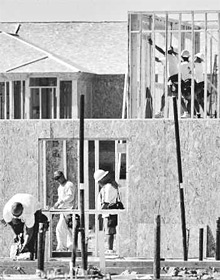 |
 |
 |
 Editorials | At Issue | February 2006 Editorials | At Issue | February 2006  
Texans, Mexicans Worlds Apart on Immigration
 Angela Shah & Dianne Solís - Dallas Morning News Angela Shah & Dianne Solís - Dallas Morning News


| | Many sectors of the U.S. economy, including construction, depend on low-cost immigrant labor, legal or not. The polls – one done in Texas and the other in Mexico – illustrate a stark divide on perceptions over the economic impact of illegal immigration into the U.S. (AP) |
Two decades ago, Alan Riding first characterized U.S.-Mexico relations in his book title, Distant Neighbors. Now, two polls show that, when it comes to immigration, the metaphor still applies.

More than half of Texans polled said they believed illegal immigrants hurt the U.S. economy.

Overwhelmingly, Mexican residents had the opposite answer, with 83 percent of respondents south of the border saying undocumented migrants boost the American economy.

"All politics is local, even international politics," said pollster Daniel Lund in Mexico City. "That border represents a convenient dividing line between two people who see the world differently."

Certainly, many sectors of the U.S. economy – construction, hospitality, restaurants – depend on low-cost immigrant labor, legal or not.

A vibrant building industry has kept the national economy afloat since the tech bust in 2001.

Magnus Lofstrom, an assistant professor of economics at the University of Texas at Dallas, said there is a perception that immigration might hurt the native-born population, that they take jobs away. "However, there's very little research that supports that view," he said.

However, a constant influx of immigrants does create a more competitive labor market, said his UTD colleague Donald Hicks, a professor of political economy.

And that escalates tensions for native workers, "particularly when it's harder and harder for lower-income workers to move from step one to step two on the American success ladder," Dr. Hicks said.

Contributions

Sebastian Martínez, a Mexican-born hospital nutritionist in Fort Worth, said he has a difficult time understanding the Texas responses to the poll. "We are so much a fundamental part of the Texas economy," he said.

Immigrants' contributions aren't noticed because they pay in cash, rather by credit cards, said Mr. Martínez, who lives legally in the U.S.

He is close to the immigration issue. He works with an association of immigrants from Zacatecas, which sends so many of its residents north of the border that its governor refers to the Mexican state as bi-national.

For some Texans, the key word in the immigration debate is illegal.

"I have no opposition to those coming into our country legally," said Lillian Townsend, a former school librarian in Magnolia. "I think they are an addition to our country. There are a lot of jobs that the Caucasian people won't do."

Farmers Branch retiree Katherine Meyer said the United States is "supposed to be a country of laws, and this is not following the law."

About the polls

Mexico City newspaper El Universal's polling unit conducted the Dallas Morning News/Al Día/El Universal poll, interviewing 1,000 registered voters Feb. 10-13. It has a margin of error of plus or minus 3.2 percentage points. Blum & Weprin Associates Inc. conducted the Texas poll of 1,482 registered voters Feb. 9-15. It has a margin of error of plus or minus 3 percentage points.

Pollsters gave respondents the option of responding in English or Spanish.

In Texas, Hispanics make up a third of the population. They accounted for about 24 percent of Texas' registered voters in 2004, according to the William C. Velasquez Institute, a nonpartisan think tank in San Antonio.

Jacobo Kupersztoch, a Mexico-born molecular biologist who's now a U.S. citizen, said the results of the two polls could have been influenced by the violence along the border.

"I really think there is a negative feeling – and rightfully so – when so many border towns are being exposed to drugs and the marketing of drugs and killing because of drugs," said Dr. Kupersztoch, who lives in Dallas. "It is projecting a very bad image of what Mexicans are and what migrants are."

In some ways, the diverging views reflect the U.S.-Mexican relationship at large.

Mexicans tend to applaud fusion with the United States. They sent home $20 billion in earnings and celebrate the undocumented worker. One of the top songs in Latin America recently was "Mojado," or "Wetback," by Guatemalan Ricardo Arjona and the Mexican band Intocable.

Americans tend to have a more contradictory attitude toward the same ties. Mexico is America's top trading partner, second only to Canada. Yet, billion-dollar remittances sent back to Mexico by immigrants are derided as an economic drain of U.S. resources and groups such as the Minutemen seek to protect the border from illegal immigrants.

Not surprising

For some, the diverging poll results weren't that surprising, especially in a post-9/11 world where security is such a high priority, said Mexican Consul Carlos García de Alba in Dallas.

Regardless, he has no doubt that Mexican labor makes a positive contribution to the American economy.

"It's work that native-born Americans won't do," he said. "The pay is lower than what native workers want."

In Washington, D.C., Roberto Suro, director of the nonpartisan Pew Hispanic Center, said Mexican leaders are even now claiming some credit for prosperity in the United States.

"You have an interesting number of political leaders in Mexico, who are now promoting the idea that Mexicans in the U.S. are the key to U.S. economic gains," he said.

Email ashah@dallasnews.com and dsolis@dallasnews.com | 
 | |
 |



